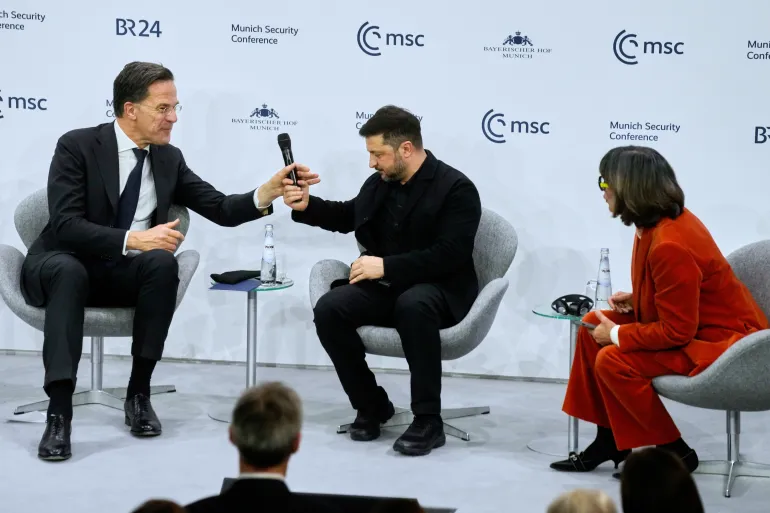Deadly drone strikes cloud US-brokered Russia-Ukraine talks in Geneva | Russia-Ukraine war News
A deadly exchange of drone strikes has killed one person in Ukraine and one in Russia and cast doubts on the prospects of a ceasefire before another round of negotiations to end the war next week.
News of the deaths comes as Ukrainian President Volodymyr Zelenskyy and US Secretary of State Marco Rubio signalled hurdles to reaching an agreement in Geneva as the conflict is about to enter its fifth year.
Recommended Stories
list of 4 itemsend of list
Zelenskyy told world leaders at the Munich Security Conference on Saturday while he hopes “substantive” progress will be reached during the trilateral meeting next week, it often feels like the two sides “are talking about different things” in negotiations.
“The Americans often return to the topic of concessions, and too often those concessions are discussed only in the context of Ukraine, not Russia,” Zelenskyy said.
Rubio said it’s unclear if Moscow truly wants to make a peace deal.
“We don’t know if the Russians are serious about ending the war,” he said before the same Munich event. “We’re going to continue to test it.”
Among the most contentious issues in the negotiations is Russia’s demand for a full withdrawal of Ukrainian troops from the remaining parts of Ukraine’s eastern region of Donetsk that it still controls.
Ukraine has rejected a unilateral pullback and wants Western security guarantees to deter Russia from relaunching its invasion if a ceasefire is reached.
Rubio did not attend a Ukraine-focused meeting with European and NATO leaders held on the sidelines of the first day of the Munich conference on Friday, citing scheduling issues.
In Munich on Saturday, Zelenskyy insisted Russia should not get away with its attack on Ukraine. He said he hoped the United States would stay involved in the peace negotiations and European countries would deepen their involvement.
Dutch Foreign Minister David van Weel told Al Jazeera while US President Donald Trump should be credited with moving talks forward, he should put more pressure on Russian President Vladimir Putin instead of Zelenskyy.
“Putin has shown no goodwill to come to the table and make a serious deal. The Ukrainians are ready,” van Weel said.

Last week, Zelenskyy said the US had given the warring parties a June deadline to reach a deal, although Trump’s previous ultimatums have not resulted in a breakthrough.
Two previous rounds of trilateral talks in Abu Dhabi, led by US envoys Steve Witkoff and Jared Kushner, reportedly focused on military issues such as a possible buffer zone and ceasefire monitoring.
Hundreds of thousands of soldiers and tens of thousands of civilians have been killed since Russia launched its full-scale invasion of Ukraine on February 24, 2022, according to many estimates, making the war Europe’s deadliest since World War II.
Russia is suffering “crazy losses” in Ukraine with about 65,000 soldiers killed on the battlefield over the last two months, NATO Secretary-General Mark Rutte told the conference.
Separately, Rutte told a media roundtable the NATO alliance is strong enough that Russia would not currently try to attack it. “We will win every fight with Russia if they attack us now, and we have to make sure in two, four, six years that same is still the case.”
Among the latest casualties was an elderly woman killed on Saturday when a Russian drone hit a residential building in the Black Sea port city of Odesa, Ukraine’s State Emergency Service said.
On Wednesday, Russian strikes also killed three children, including two-year-old twins and their father in the northeastern region of Kharkiv.
In January alone, Russia launched more than 6,000 drone attacks against Ukraine, according to Zelenskyy. But he added Ukraine will soon produce enough interceptors to make Russia’s Iran-made Shahed drones “meaningless”.
He also told the Munich conference that every power plant in Ukraine has been damaged in Russian attacks.
In Russia, a civilian was killed in a Ukrainian drone strike on a car in the border region of Bryansk, Governor Alexander Bogomaz said.
The attacks came a day after a Ukrainian missile strike on the Russian city of Belgorod near the border with Ukraine killed two people and wounded five, according to Governor Vyacheslav Gladkov.
Gladkov earlier said the attack also caused serious damage to energy facilities and electricity, heating and water supplies were cut off. Three apartment buildings in the city sustained damage, he said.
Ukrainian member of parliament Oleksiy Goncharenko, meanwhile, accused Moscow of launching “energy terror” with attacks on electricity facilities in the heart of winter.
“I can’t call it any other way because when it is minus 20 Celsius in Kyiv and you don’t have heating, you don’t have electricity in your apartment, you’re just freezing and that is awful,” Goncharenko told Al Jazeera in Munich.
“I think it’s time for the United States to put real pressure on Russia. Yes, they are at the table, but it’s time to put real pressure to make them have real negotiations, because what we have today is not real negotiations.”
